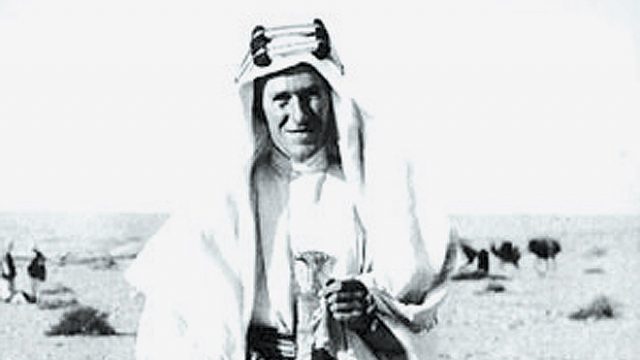Ned Lawrence. John Hume Ross. G B Shaw’s Colonel Meek. Thomas Edward Shaw. In the end, he would be known simply as “Lawrence of Arabia”, as the Anglo-Irishman who donned the flowing robes of an Arab and fought hard, if unsuccessfully, for the cause of Arab independence.
For those weaned on the Lawrence legend via David Lean’s movie, the book that placed T.E. Lawrence alongside the gods of literature can come as a blast of bitter heat, a corrective to the romantic wateriness of the legend. This is the first paragraph of Seven Pillars of Wisdom, the account of his role in the Arab rebellion during World War I that he began writing in 1919 and finished in 1926:
“Some of the evil of my tale may have been inherent in our circumstances. For years we lived anyhow with one another in the naked desert, under the indifferent heaven. By day the hot sun fermented us; and we were dizzied by the beating wind. At night we were stained by dew, and shamed into pettiness by the innumerable silences of stars. We were a self-centred army without parade or gesture, devoted to freedom, the second of man’s creeds, a purpose so ravenous that it devoured all our strength, a hope so transcendent that our earlier ambitions faded in its glare.”
In its abridged version, Revolt in the Desert, Seven Pillars of Wisdom did very well in the Boy’s Own market. It was a dazzling tale of desert adventure, starring a renegade archaeologist who took his place beside Feisal and Auda Abu Tayi in the capture of Akaba, who swept down upon the Turks fighting alongside his Arab friends, who survived the desert heat and, in a famously sadomasochistic episode, torture and rape inflicted by Fakhri Bey, the governor of Medina.
If that were all, T.E. Lawrence would still be feted as the author of one of the most stirring adventure stories of all time. Anthony Quinn, who played the part of Auda Abu Tayi in Lean’s film, testified to the impact of the legend. Quinn had himself costumed and made up as the Arab leader, intending to surprise Lean by appearing out of the sands on foot. He had not bargained for the presence of about four hundred locals. “They spotted me on the horizon and began to chant: ‘Abu Tayi, Abu Tayi, Abu Tayi…. Lean asked one of his assistants about the ruckus. ‘It’s just the Arabs, sir,’ the assistant replied. ‘They’re chanting for Abu Tayi.’ ‘Well,’ Lean said. ‘Screw Anthony Quinn. Let’s hire that guy instead.’”
Lawrence’s own account was both more and less flamboyant. In the middle of a downhill camel charge on the enemy, his beast tripped. “I lay there, passively waiting for the Turks to kill me, continuing to hum over the verses of a half-forgotten poem… After a long time I finished my poem, and no Turks came, and no camel trod on me:… there was a great noise in front. I sat up and saw the battle over.” The line Lawrence enthusiasts prefer to quote is slightly more dramatic: “The sword also means clean-ness and death.”
By 1920, it was clear that Lawrence’s dreams for Arab independence had been harshly belied. The French wanted Syria, the British wanted Iraq; and America wanted nothing to do with the mess. Lawrence was bitterly disappointed, but then he had set down his opinion of war in Seven Pillars. “Philosophically, it was idiotic, for while opinions were arguable, convictions needed shooting to be cured.” He would have undoubtedly classified the American action in Iraq as an example of a “murder war…only an exterminative variety, no more absolute than another”.
The book into which Lawrence had poured his passions, his convictions and not a small quantity of his cynicism as well didn’t do for the Arab nations what the author had hoped. But it achieved something else, a distinction recognised by men like E.M. Forster and Winston Churchill. The latter wrote of Seven Pillars of Wisdom: “It ranks with the greatest books ever written in the English language. As a narrative of war and adventure…it is unsurpassable.” That verdict, unlike most passed on the books of one’s times, will stand.




